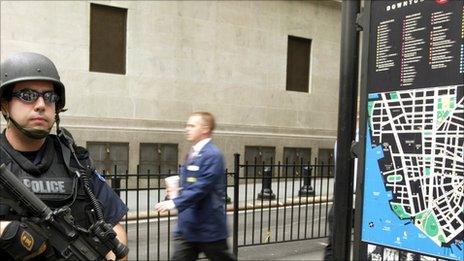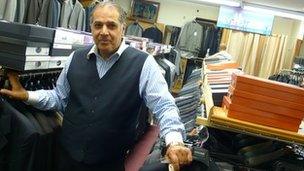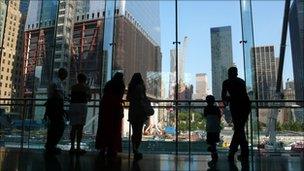Wall Street and the aftermath of 9/11
- Published

Moshe Rouach was getting ready for business as usual that morning.
His cramped menswear store had done a good trade in the years since he moved in.
Here, up a dark flight of stairs from the lights and bustle of Broadway, just a block away from the World Trade Center, Rouach sold suits to a mixture of office workers and bargain-hunting tourists.
But VIP Men's Suits didn't get to open that day.
By the time the second plane had smashed into World Trade Center 2, Moshe had joined his neighbouring business owners and workers outside.
Crowds of them stood on Broadway, staring up at the enormous, smoking towers.
Moshe remembers the sound of the planes hitting.
"It was like a nuclear bomb going off," he says.
"We went and stood outside, watching, and when the first tower came down everyone ran for their lives."
Moshe didn't return to his shop for two months.
One small business
The World Trade Center site was - is - a 16-acre plot in Lower Manhattan.
Beyond the thousands of deaths and the physical destruction, the attacks also devastated the basic commerce of a swathe of Manhattan.

Moshe Rouach nearly lost his menswear business after 9/11
When he was finally allowed back into his shop, Moshe found it physically more or less intact, but all of his merchandise destroyed.
Insurance covered only half of it and Moshe was nearly put out of business permanently.
In the years after the attack though, as Ground Zero became the most compelling tourist site in the country, he found trade picking up.
A few years after 9/11, VIP Men's Suits was as successful as it had been before the attacks.
The fortunes of one small business mirror those of the city as a whole.
Following 9/11, New York's economy slowed painfully.
According to the City of New York's Comptroller's office, in the final quarter of 2001, the city economy suddenly started to shrink, first by just a percentage point and then, in the first months of 2002, by 4% a quarter.
It went on contracting for another two years when, finally, it turned around.
New York's famed resilience asserted itself and by 2004, its economy was growing again by nearly 5% every three months.
Too powerful
Al-Qaeda's economic target was much broader than New York City.
The World Trade Center sits a few blocks from Wall Street, the heart of America's gargantuan financial services industry.
Even more than the city that hosts it, that industry proved far too powerful to be significantly disrupted.
The financial markets shut down for days after the attack, and prices fell sharply when they reopened, but that was all.
Wall Street's big institutions were too big for the terrorists.
They showed that in the years following 2001.
According to government statistics, the finance and insurance industry accounted for 6% of the US's economy in 1990.
By 2001 that had risen to 7.7%.
The encroachment of Wall Street into the rest of the US economy has continued unabated in the past decade so that now the industry makes up 8.4% of the entire US GDP.
All of which suggests the terrorists ultimately failed.
They may have killed thousands, but their attempt at undermining the US economy by demolishing its biggest symbol didn't work, did it?
9/11 and the crisis
The 10th anniversary is an unfortunate time to be asking.
These days America suffers the fallout of a recession far worse than anything that immediately followed 9/11.
The collapse of the housing market, the subsequent paroxysms of the financial sector and the resulting recession left the US economy in a desperate state, one which government seems incapable of addressing.
But, in the debilitating arguments over what to blame for the current economic malaise, a significant number of economists and commentators do see a connection between 9/11 and the financial crisis.
Such was America's shock at seeing itself attacked, that policymakers worried about the impact on consumer and investor sentiment.

America's economy rebounded much more quickly after 9/11 than it has from the financial crisis
Al Qaeda's attacks could only have a limited, direct impact on the economy, but there was a fear that the indirect effect on the all-important animal spirits of US capitalism could be devastating.
The Federal Reserve was particularly alert to this danger.
So it is that as the economy faltered after 9/11, the Fed started cutting interest rates and kept on lowering them for another two years.
A serious economic downturn never materialised, so possibly the Fed's approach worked.
But years and years of low interest rates - "easy money" as economists would say - provided a necessary prerequisite for a housing boom on an unprecedented scale.
A boom and terrible bust have certainly followed, as has the near-collapse of the same financial sector that was apparently so immune to the terrorists' violence.
If Wall Street still dominates the US economy, it does so in part because American taxpayers have propped it up.
New towers
In economic terms, the US was quickly able to push beyond the hesitant, fearful moments that followed the destruction of the old World Trade Center.
It's not at all clear that the most recent traumas will be so easily escaped.
True, there is a new set of shining towers rising up from the World Trade Center site.
Ground Zero, as New York no longer wants to call it, is a construction site racing to completion.
Every week the new buildings reach higher, while beneath them, the streets teem with New Yorkers making a buck and visitors marvelling at the rebirth of Lower Manhattan.
But the economic vibrancy of these streets hasn't reached the rest of the country and even here, prosperity is far from certain.
Reflecting on the thousands that throng the blocks around his store, Moshe Rouach says: "There's a lot of people here again. But they're not spending."
He places a lot of faith in the success of the new buildings down the block.
"Thankfully with the new World Trade Center, there will be lots more workers," he says.
"Hopefully things are going to shape up."
- Published2 September 2011